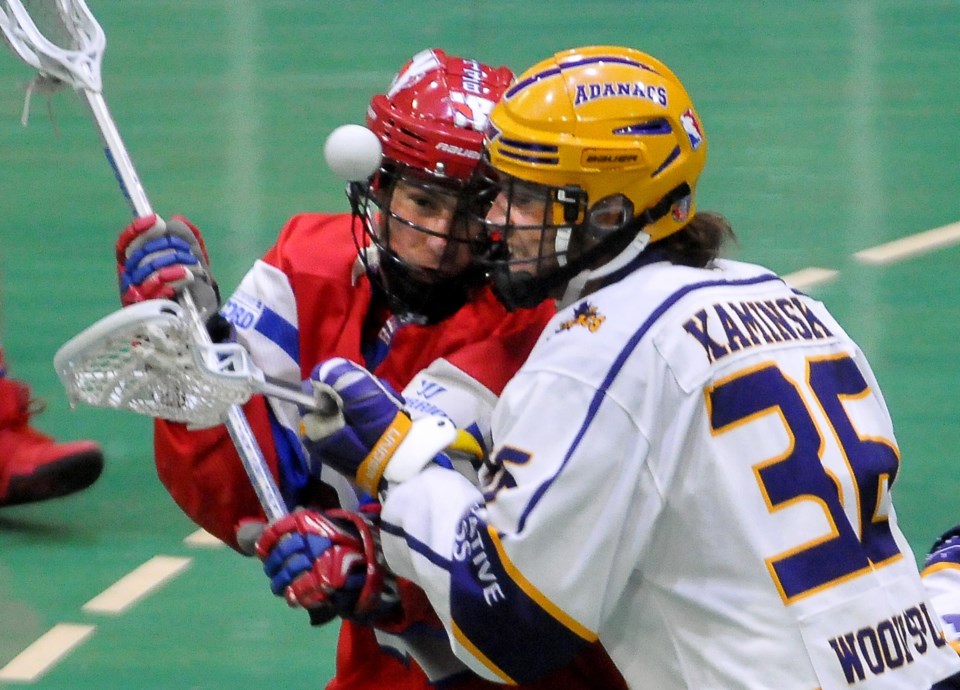The Western Lacrosse Association takes its players’ safety serious.
The league is showing that they intend to be as good as their word with the recent announcement that they are partnering with the B.C. company HeadCheck Health to improve the league’s concussion protocol and in-game decision making process.
Training and therapy staff of all seven WLA teams will begin the 2018 season – which starts May 23 when the Burnaby
Lakers visit Langley – with the company’s mobile testing app, which will help in assessing potential concussions during the game, as well as record valuable data that can be used in future decision-making.
“So much attention in recent years on impact sports has been on the effects of concussions,” WLA commissioner Paul Dal Monte said. “One of the things that we really wanted to make sure we did was develop a strategy and plan to make sure we did everything possible to keep our players safe and give our trainers the tools they need to make sure they are able to conduct better testing and make better decisions in a game and even over the season for that matter.”
Dal Monte says training staff from around the league have been doing a good job of monitoring and assessing each individual case as it occurs. The HeadCheck app is another tool that will help standardize a league-wide protocol and allow teams to maintain and collect information on each case.
Although unsure of any year-to-year trend in the league regarding concussions, Dal Monte said last year – his first as commissioner – saw fewer than a handful reported.
“It was a small number, and a lot of that has to do with ensuring the way the game is played, to reduce head contact,” he noted. “As a league we’re paying very, very close attention and are, for at least recent times but certainly my first year, focusing heavily on high sticks and any contact to the head and treating those very seriously from a penalty and discipline perspective.”
New Westminster Salmonbellies’ captain and Burnaby South Secondary vice-principal Curtis Hodgson said the league’s proactive steps over the past year in addressing hits to the head was welcomed news for players, and he believes giving trainers more means to evaluate players is something everyone supports.
“I think it’s a great step, and I think (Dal Monte) has made it a priority to improve things,” remarked Hodgson. “He and the board of governors have done a few things to ensure players safety is taken more seriously. They need to invest in keeping players safe, and keeping the game safe so that players can play for a long time.”
HeadCheck CEO Harrison Brown said the goal is to help the WLA continue making the right decisions in cases of a suspected concussion, and allow teams and the league to monitor the data as a means to make future informed decisions.
“During the game (training staff) will be able to make better decisions, more appropriate and more well-informed decisions. We’re also helping the WLA by doing analytics on all the teams. What basically we’ll do is provide a once-a-month report back to the WLA with some high-level information about how many tests are being done, where they are occurring, are teams doing them properly, and are teams following the concussion protocol.”
He said information gathered will be able to assist teams in improving their evaluation and response to potential concussions.
For Dal Monte, the changes in the sport – and around the sports world – have greatly benefitted from new technology, but part of the solution also involves administering and changing rules to eliminate checks to the head – including heavy penalties to those who level high hits.
As a tool in treating the injured, technology has certainly been a game-changer.
“The depth of knowledge is so much deeper, you combine that with technology which affords us with so many tools to do things better and smarter, and we have better equipment than 20 years ago,” said Dal Monte.
HeadCheck Health began in 2013 and after testing with UBC varsity teams, began partnering with other sports organizations two years ago. It is being used by B.C. rugby, football and hockey programs around the province.



